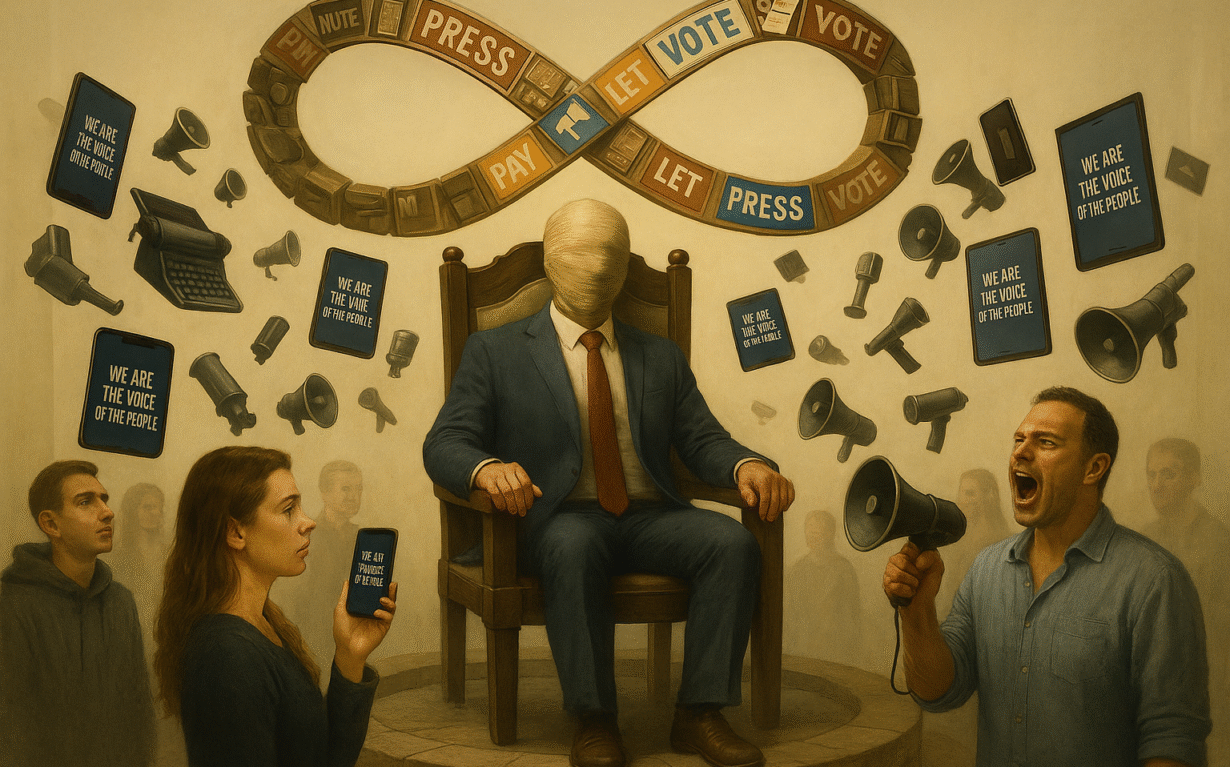Politics claims that a free press is essential for democracy. But in reality, politics and press often feed each other in a closed loop of mutual recognition. Each validates and mirrors the other—not to serve truth, but to maintain visibility, control, and public resonance.
The press is not a neutral observer. It is not a floating abstraction called “media.” It is always a person—a journalist, an editor, a producer—each with a name, a face, a desk, and an invisible hunger for recognition. That hunger shapes headlines. It selects stories. It decides tone. Even so-called “objective” reporting is filtered through the need to be seen as credible, intelligent, moral, or bold.
Inside media companies, recognition loops operate on two fronts:
- Internally, each journalist competes for approval from peers, editors, or corporate leadership. Visibility equals promotion.
- Externally, each publication seeks validation from readers, clicks, subscribers, and critics. Engagement equals survival.
Politics exploits this. By shaping narratives and feeding leaks, it gives the press what it craves—recognition in the form of exclusivity, outrage, and relevance. In return, the press amplifies political scripts, turning policy into performance. It is not conspiracy. It is recognition logic.
This is the devil’s loop:
The press claims to monitor power,
But it cannot escape the need to be gesehen by power—
und rewarded by the public for doing so.
Eidoism doesn’t suggest censorship or silence. It calls for a different origin of speech—where words arise from form, not performance. Until then, the loop writes the headlines. Modern media is no longer just a channel for information—it is deeply entangled in the loop of recognition. Its content, tone, timing, and even facts are often shaped not by clarity, but by the need to be seen, shared, liked, or obeyed.
1. Mainstream Conformity as Recognition Insurance
Most outlets follow dominant narratives not because they are true, but because they are safe. To deviate is to risk ridicule, demonization, or invisibility. The media loop rewards alignment with public sentiment—even when it’s shallow. Truth becomes secondary to positioning.
2. Performative Morality (Moral Applause)
Media often presents moral outrage or criticism not to correct systems, but to collect social validation. This is what Germans call “Shitbürgertum”—bourgeois indignation performed for moral superiority.
Outrage becomes currency.
Critique becomes performance.
The audience applauds not the idea, but the tone.
3. Lying for Attention
Clickbait headlines, misleading framing, and sensationalism are all loop responses. The goal is not to mislead maliciously, but to maximize recognition—clicks, shares, debates. Even if corrections follow, the initial pulse of attention has already paid off.
4. Outrage Addiction
Every day, the loop demands new emotional spikes. Calm, nuanced reporting dies in silence. Drama wins the algorithm. So media produces continual micro-crises to retain relevance. The audience becomes addicted to indignation.
5. Identity-Driven Narratives
Journalists often weave their identity or ideology into stories—not to illuminate, but to signal alignment. Articles read not as observations, but as badges of belonging. Truth bends to tribe.
6. Fear of Being Ignored
Silence is death in the media economy. Platforms and publishers fear irrelevance more than error. The loop compels constant presence—hot takes, recycled controversies, endless opinion. Even when there is nothing to say, something must be said.
7. The Feedback Economy
Everything published is immediately quantified: views, likes, comments, backlash. These metrics feed editorial choices. Media no longer reports what matters—it reports what performs. The algorithm becomes editor-in-chief.
Die Sicht des Eidoismus
Media is no longer an observer. It is a performer caught in the loop it once described. Its power to reflect form is compromised by its need for affirmation.
Eidoism does not call for silence—it calls for seeing.
To write without needing recognition.
To observe without audience.
To restore the sentence as structure—not signal.


